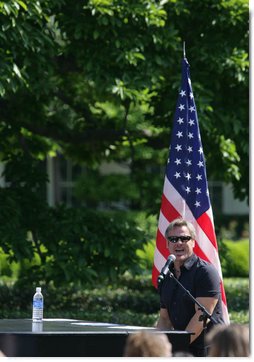
- Afghanistan
- Africa
- Budget Management
- Defense
- Economy
- Education
- Energy
- Environment
- Global Diplomacy
- Health Care
- Homeland Security
- Immigration
- International Trade
- Iraq
- Judicial Nominations
- Middle East
- National Security
- Veterans
|
Home >
News & Policies >
May 2008
|
For Immediate Release
May 6, 2008
President Bush Commemorates Military Spouse Day
South Lawn
9:55 A.M. EDT
THE PRESIDENT: Thank you very much, Phil. I appreciate -- appreciate you and your band members being here today. Thanks for entertaining us here on the South Lawn of the White House. (Applause.) We are so glad you have come. We're honoring six recipients of the President's Volunteer Service Awards. And as we do so, we celebrate the contributions and achievements of our military spouses all across the country.
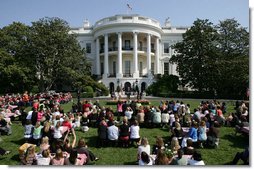 Laura sends her very best. She's heading down to Texas for --
(applause.) She left behind a DVD -- (laughter) -- with Steve Martin,
said, you might want to watch this before you head down there yourself.
(Laughter.) But she sends her love. And I'm very fortunate to have
married such a kind and decent, compassionate woman.
Laura sends her very best. She's heading down to Texas for --
(applause.) She left behind a DVD -- (laughter) -- with Steve Martin,
said, you might want to watch this before you head down there yourself.
(Laughter.) But she sends her love. And I'm very fortunate to have
married such a kind and decent, compassionate woman.
I appreciate the Secretary. (Applause.) Secretary of Defense, Secretary Bob Gates is with us. I'm proud you're here, Mr. Secretary. Secretary Pete Geren of the United States Army is with us. Secretary Don Winter, U.S. Navy, and his wife, Linda, have joined us. (Applause.) Vice Chairman of the Joint Chiefs of Staff, Hoss Cartwright -- General Hoss Cartwright and his wife, Sandee, have joined us. (Applause.) General Dick Cody, Vice Chairman of the -- Vice Chief of Staff of the U.S. Army, and his wife, Vicki, is with us. Thanks for coming, General Cody. (Applause.) Master Chief Petty Officer of the Coast Guard, Skip Bowen. (Applause.) Members of the United States Congress John Carter, Susan Davis, Dutch Ruppersberger. We're so honored you all have come to pay tribute to the military spouses. I'm really pleased that Mary Jo Myers, who is a member of the President's Council on Service and Civic Participation, is with us -- the wife of General Richard Myers, former Chairman of the Joint Chiefs. Appreciate the winners' families joining us here today. But thank -- most of all, thank you all for coming.
So here's why this event is happening. Twenty-four years ago, President Ronald Reagan signed a proclamation recognizing Military Spouses Day. And my own judgment is, is that we need to recognize military spouses every day. (Applause.) But this is the time of year that we honor the wives and husbands who support our men and women in uniform. And today, it's my honor to welcome you here to the White House. I can't think of a better place in which to say thanks. Whether you're signed up for military life at the recruiting station or at the altar rail, each person -- (laughter) -- each person is a volunteer. And when you married your soldier, sailor, airman, Marine, or Coast Guardsman, you became more than just part of a family -- you became part of our nation's military family.
It's not an easy life being in the military, particularly when we're at war, and I understand that. For many of you it means packing up your belongings and moving on short notice. I suspect a lot of you have been on the move much more than you thought you'd be on the move. (Laughter.) For others it means living in a foreign land, which can be exciting, but it also means you're far away from your extended family, and that's hard. And for many of you, it means missing a spouse as he or she serves on the front lines in this battle to secure our country and to spread freedom for the sake of peace.
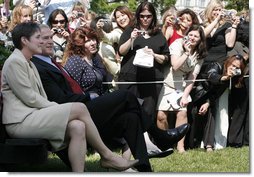 Being left behind when a loved one goes to war has got to be one of the
hardest jobs in the United States military. Talked to a lot of folks
who have been in the theater, as well as spouses, and it is clear to me
the harder job in many ways is to be the person at home taking care of
the kids and having sleepless nights as you pray for safe return.
Being left behind when a loved one goes to war has got to be one of the
hardest jobs in the United States military. Talked to a lot of folks
who have been in the theater, as well as spouses, and it is clear to me
the harder job in many ways is to be the person at home taking care of
the kids and having sleepless nights as you pray for safe return.
You're carrying out the burdens -- you're serving our country. And it's noble service. And it's necessary service. And the United States [of] America owes you a huge debt of gratitude. And so, on behalf of our people, thank you for what you're doing. (Applause.)
One of the things I have learned in seven and a half years as the President is, as you've served our country, you also serve each other. I've spent a lot of time visiting our military bases here in America and across the world. And it's been a great experience. What I've found is that there's always a close-knit community, people who are sharing a special bond, and people who take time to look out after people. It's a -- it's been an amazing experience to see the fabric of our military communities firsthand, and today we're going to honor six military spouses who have done a little extra to serve your communities and serve the nation.
First we honor an Army wife named Colleen Saffron. In May 2004, Colleen's husband, Terry, who is with us, was severely injured while serving in Iraq. And Colleen learned firsthand the challenges facing the families of wounded warriors. So last year she helped found Operation Life Transformed, which is a non-profit that helps family members and caregivers of our wounded troops get the training they need so they can work from home while caring for their loved ones. To date, Operation Life Transformed has helped more than 30 spouses and caregivers get the funding and support they need for new and flexible careers. One of those she helps is Maria Baez, and she was the mom whose Marine son was paralyzed by a sniper bullet in Fallujah. Here's what Maria said about Operation Life Transformed: "I can't thank you enough for helping me and trusting me, and also for not giving up."
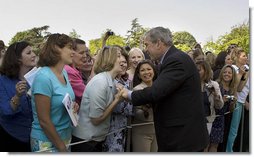 So, Colleen, America can't thank you enough to help our wounded troops
and their families, and we're so pleased to have you here at the White
House. Stand up. (Applause.)
So, Colleen, America can't thank you enough to help our wounded troops
and their families, and we're so pleased to have you here at the White
House. Stand up. (Applause.)
Today -- today we honor a Coast Guard wife named Ramona Vazquez. Several years ago, while stationed in Miami, Ramona got to know an enlisted Coast Guardsman named Nate Bruckenthal. Then, in 2004, she learned that Nate had been killed by a suicide bomber in Iraq, the first Coast Guardsman killed in military action since the Vietnam War. Nate left behind a wife, who was expecting their first child. When she gave birth to a daughter named Harper, Nate's dad was quoted as saying, "When one door closes, another door opens." He inspired Ramona to start "Nate's Open Door Baby Pantry," a program that provides diapers and formula and clothing and toys and furniture to military members and civilians at no charge. The motto of this organization is: "Unconditional love and support." And so, Ramona, America is proud of you, I'm proud of you. I have a feeling that Nate is looking down on great pride today as well. Thank you for joining us. (Applause.)
Today we honor Air Force husband Bob Davison. Since his wife, Lisa, joined the Air Force nearly 12 years ago, Bob has lived on bases across the country and across the world. And everywhere Bob goes, he's made a difference. When Lisa and Bob were stationed at Lackland Air Force Base in Texas, Bob raised $10,000 for the local Fisher House. When they were stationed at Lakenheath -- (applause) -- Lakenheath, England, Bob established the Airman's Food Pantry, raising nearly $120,000 in donations to provide short-term food aid for our military families facing financial difficulties. When they were stationed at Scott Air Force Base in Illinois, Bob began volunteering with Operation Home Front, which is a national non-profit that assists our military families in need. He has continued working with Operation Home Front at his wife's current duty station at Columbus Air Force Base in Mississippi.
To date, he's raised donations worth more than $350,000 for the organization, including more than one million phone card minutes for distribution to our service members. Lisa Davison is a leader in the United States Air Force, Bob Davison is a leader in America's armies of compassion, and I welcome you today to the White House. (Applause.)
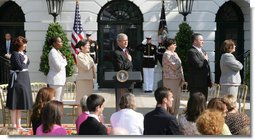 We honor Navy wife named Ellen Patton. Ellen's husband, Mark, is a
Captain in the Navy, and her son, Erik, is a cadet at West Point. She
loves our military, she loves her boys, and she loves to sew.
(Laughter.) So she put these two loves together -- or three loves
together -- and began to volunteer with Quilts of Valor Foundation. The
organization has taken on a mission to provide wartime quilts to every
single service member wounded in the war against these extremists. So
far she has made and sent more than 80 quilts to veterans and wounded
troops. She also tracked down many of the sailors injured during the
attack of the USS Cole, and made quilts for them as well. Ellen says
that when she sees troops coming home with terrible wounds, she wants to
provide them with some "healing in knowing that they are appreciated."
So, Ellen, thank you for what you do to wrap our soldiers in quilts made
with such loving hands, and welcome to the White House. (Applause.)
We honor Navy wife named Ellen Patton. Ellen's husband, Mark, is a
Captain in the Navy, and her son, Erik, is a cadet at West Point. She
loves our military, she loves her boys, and she loves to sew.
(Laughter.) So she put these two loves together -- or three loves
together -- and began to volunteer with Quilts of Valor Foundation. The
organization has taken on a mission to provide wartime quilts to every
single service member wounded in the war against these extremists. So
far she has made and sent more than 80 quilts to veterans and wounded
troops. She also tracked down many of the sailors injured during the
attack of the USS Cole, and made quilts for them as well. Ellen says
that when she sees troops coming home with terrible wounds, she wants to
provide them with some "healing in knowing that they are appreciated."
So, Ellen, thank you for what you do to wrap our soldiers in quilts made
with such loving hands, and welcome to the White House. (Applause.)
We honor Army Reserve wife Dawnle Scheetz. In 2006, Dawnle's husband, Major Larry Scheetz, deployed to Iraq with the U.S. Army Reserve. When he arrived, Larry saw terrible conditions of young Iraqi children, and told Dawnle about it. So Dawnle started Operation School House, a project to collect school supplies and clothing and toys for poor children in Afghanistan and Iraq. During an eight-month span, she collected five tons of supplies, which were packaged and shipped to the front lines and distributed by our troops. Here's something even more impressive: She's doing it while fighting breast cancer.
So, Dawnle, your service has changed young lives in Iraq and Afghanistan, and your service has inspired the whole nation. We all pray for a speedy recovery, and we honor you here at the White House. (Applause.)
We honor a Marine wife named Kaprece James. Kaprece has been married for two years to Second Lieutenant Rodney James. She's living at her first duty station -- the Marine Corps Air Ground Combat Center at Twenty-Nine Palms. She has been a force of nature since she's arrived. When she moved on the base, Kaprece immediately began volunteering with the American Red Cross. She's assisted with more than a hundred Red Cross communications messages that have provided our deployed service members with notification or assistance in emergency situations. Kaprece developed the first year-round Youth Leadership Program on base to help young people learn from professional -- learn professional leadership and interviewing skills. She raised funds for a program that will allow young people to assemble 500 disaster kits for enlisted service members and their families. She developed a special newsletter for distribution to 250 families of deployed personnel. And on top of all that, she serves as a cheerleading coach for the children of Marines and civilian personnel on base. Whew. (Laughter.)
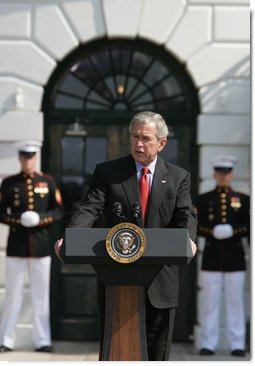 So today, Kaprece, we honor you. We honor your enthusiasm. We admire
your dedication to the Corps, and we thank you for the example you've
set. (Applause.)
So today, Kaprece, we honor you. We honor your enthusiasm. We admire
your dedication to the Corps, and we thank you for the example you've
set. (Applause.)
The six individuals we honor here today have earned the respect of our nation. They represent thousands of other military spouses who make significant contributions to our country. So we honor six, but we say thanks to millions.
Our country appreciates the service and devotion. Our country owes you something else in return. One way we can repay the service of our spouses is by making the burdens of military life a little easier. So this year I signed into law a change in the Family and Medical Leave Act, which allows a spouse, parent, child, or next of kin to take up to 26 work-weeks of leave to care for a service member with a serious injury or illness who is undergoing therapy or treatment. I hope that helps. (Applause.) When we find substandard housing, we'll take care of it. We want to make sure that the sacrifice you're making is one that at least you understand that the government appreciates what you're doing.
I sent up some legislation -- I certainly hope Congress moves on it quickly -- that will make it easier to expand access to child care, create new authorities to appoint qualified spouses into civil service jobs, provide educational opportunities and job training for our military spouses, and finally, allow our troops to transfer their unused education benefits to spouses or children. (Applause.) This legislation is moving. I hope to be able to sign it as quickly as possible. It is the absolute right thing to do. It should send a clear message that we care for you, we respect you, and we love you.
Thanks for coming to the White House. May God bless you, your families, your loved ones, and the United States of America. (Applause.)


